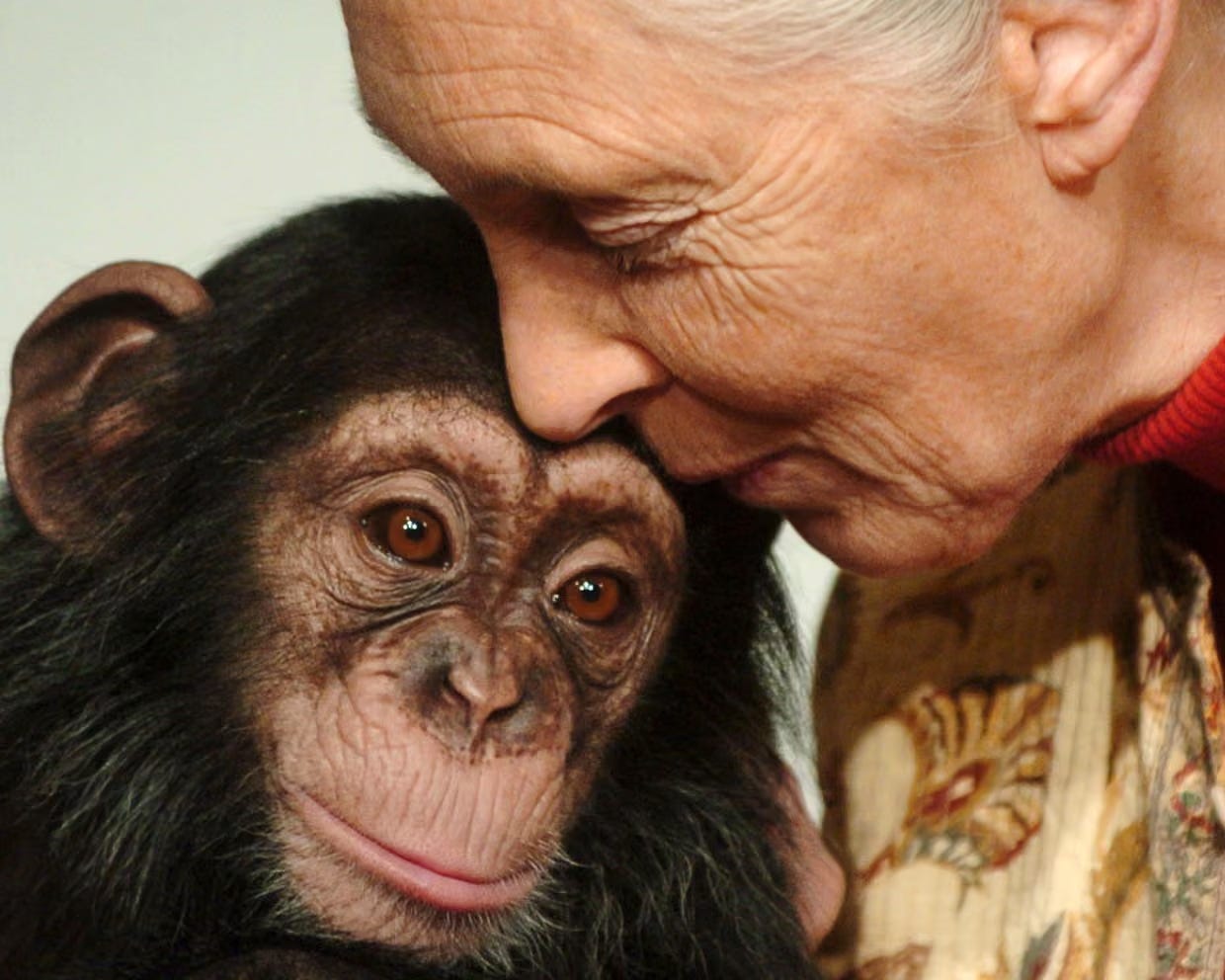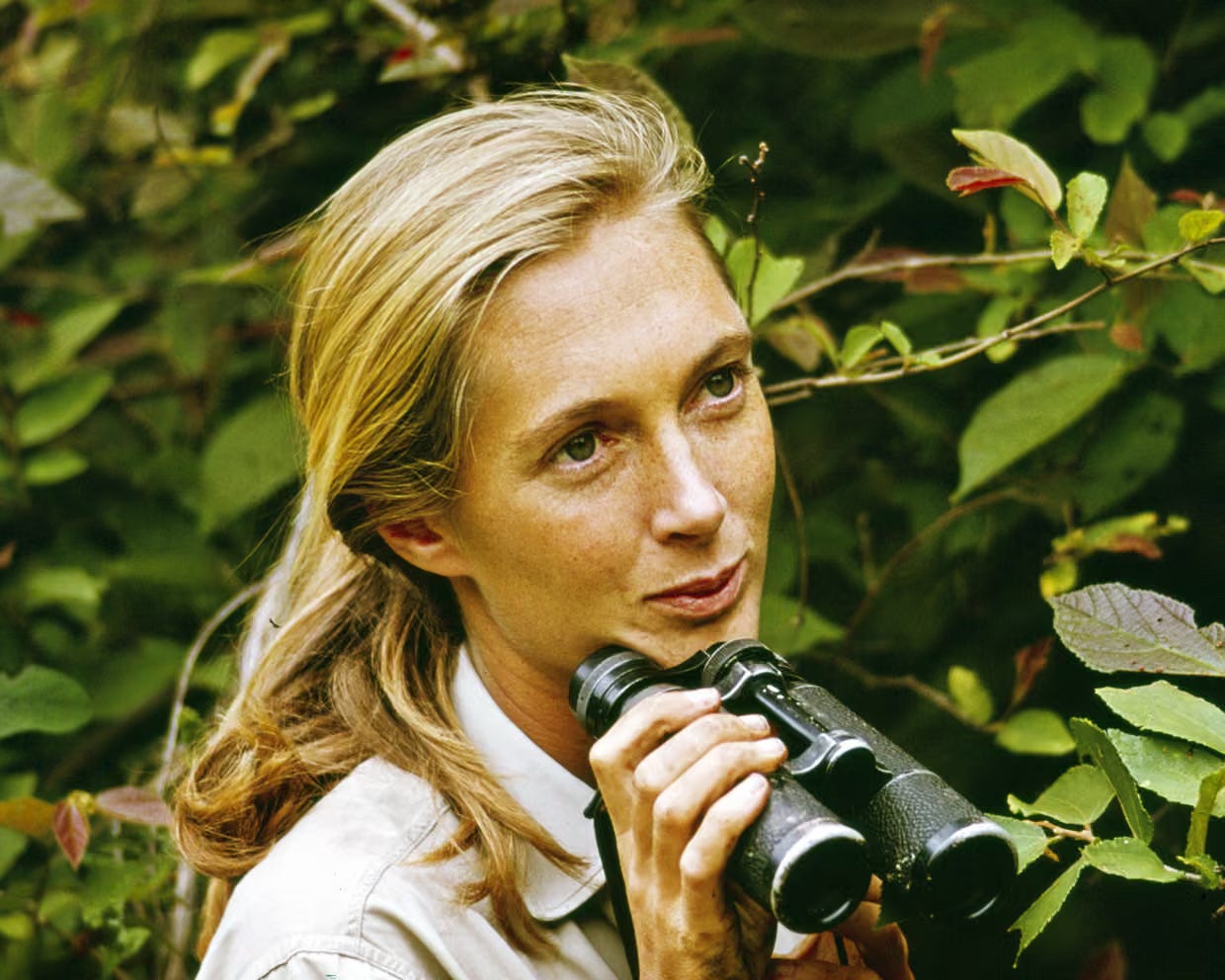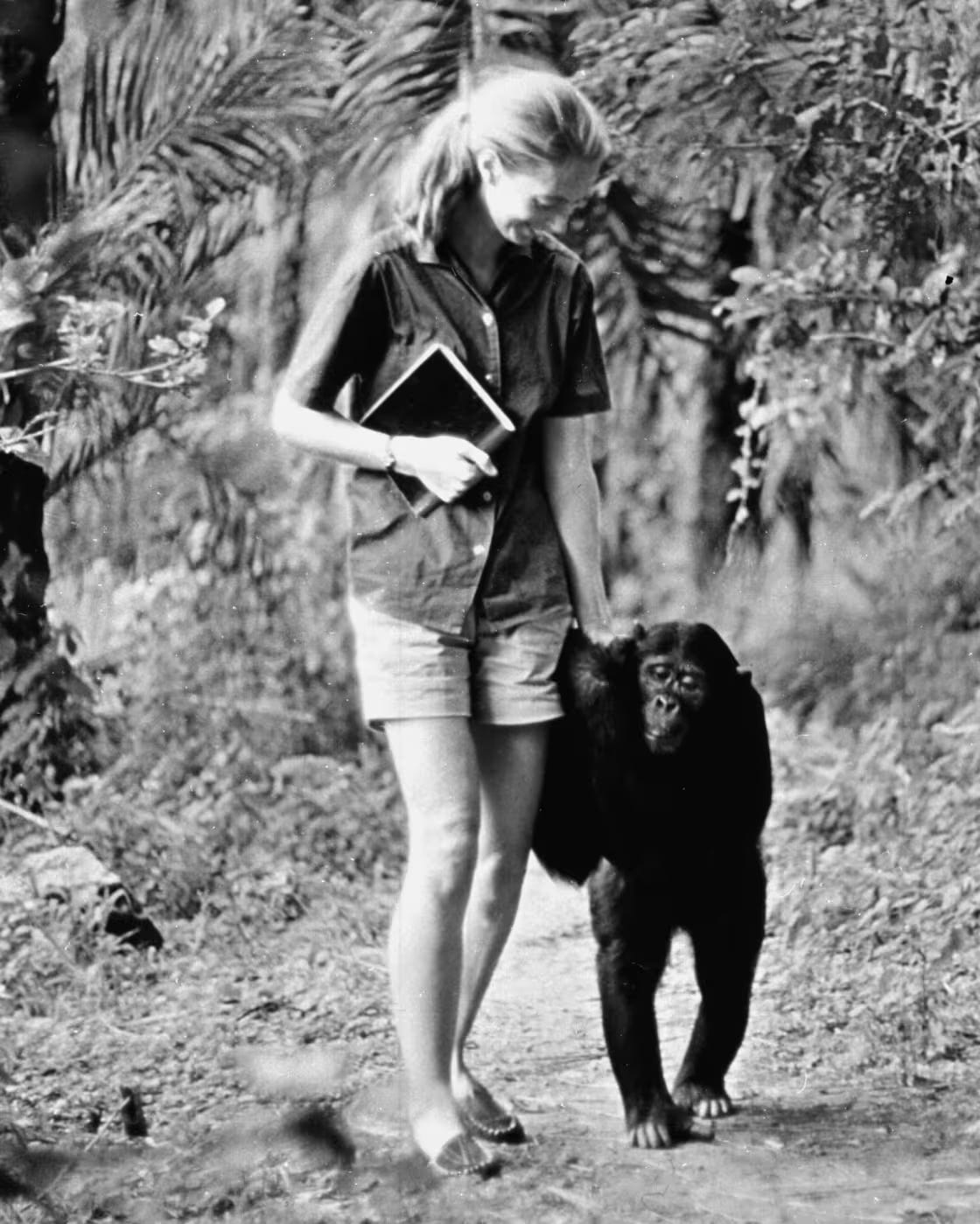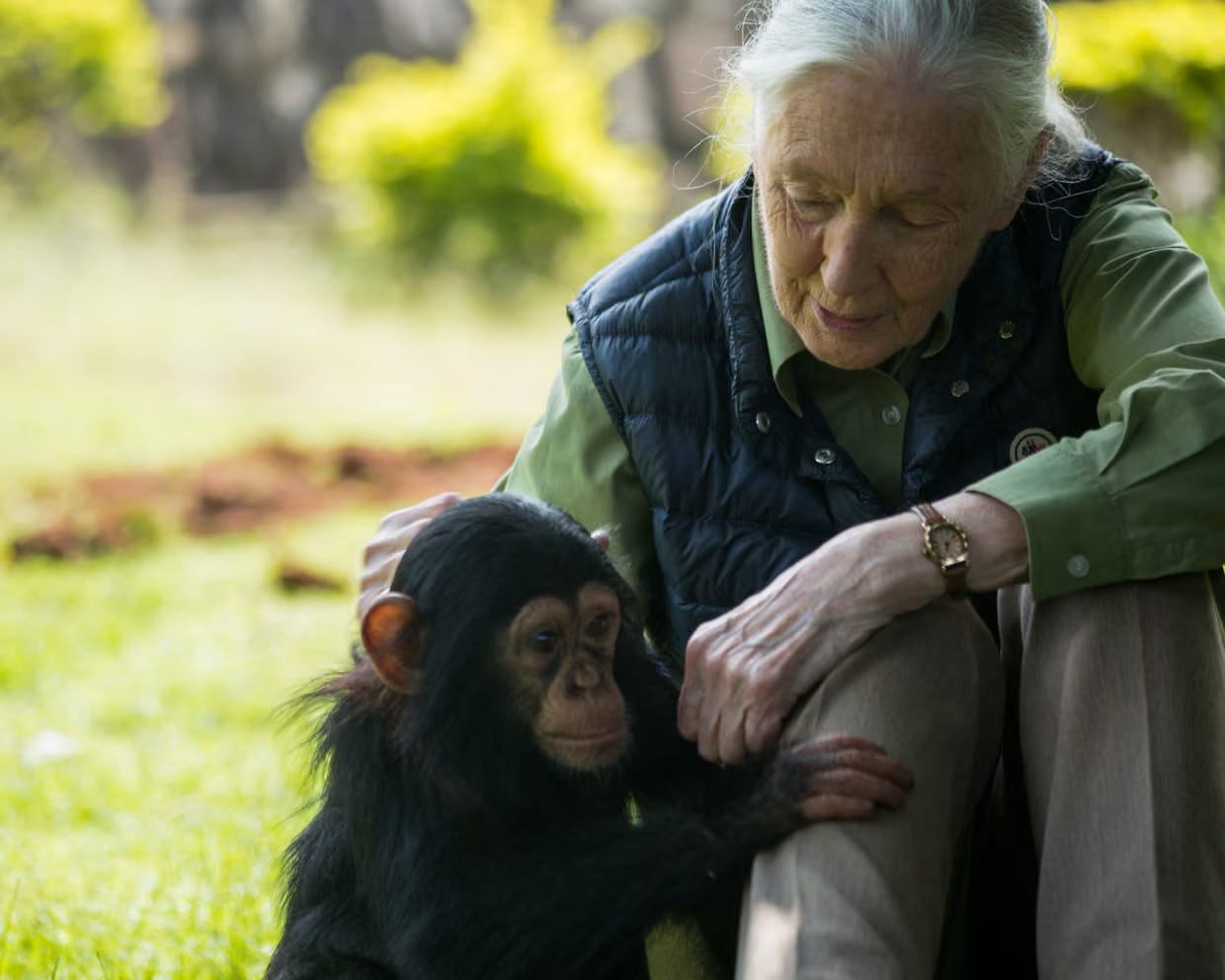Jane Goodall, The Trailblazing Conservationist Woman Who Gave Voice to the Wild and Transformed Our Understanding of Primates, Dies at 91
At 91, the groundbreaking conservationist leaves behind a global movement proving that one person’s courage can reshape our future.

The world is mourning the loss of Dr. Jane Goodall, the pioneering primatologist and conservationist whose groundbreaking work forever changed how we understand animals, humans, and the natural world. Goodall, who spent more than six decades studying and advocating for wildlife, passed away at the age of 91 in California while on a U.S. speaking tour, according to the Jane Goodall Institute.
The institute, which she founded in 1977, confirmed her death in a statement, calling Goodall a “tireless advocate for the protection and restoration of our natural world.” She died of natural causes but left behind a movement that continues to span continents, generations, and species.
From a Curious Child to a Scientific Visionary
Born in London in 1934, Jane Goodall displayed an insatiable curiosity about animals from an early age. In interviews, she often recalled sneaking into a chicken coop as a young girl to observe how hens laid eggs, so engrossed in her observations that her mother eventually called the police to report her missing. Rather than scolding her for worrying the family, Goodall’s mother listened attentively to her discoveries — a formative moment that encouraged the young girl’s inquisitiveness and gave her the confidence to pursue a path that was, at the time, all but closed to women.
In the late 1950s, Goodall visited a friend in Kenya, a trip that would change her life. There she met the renowned archaeologist Louis Leakey, who recognized her potential and sent her to study primate behavior in London. With no formal scientific training at the time, Goodall was an unconventional choice. But Leakey believed her fresh perspective and patience would reveal insights others had overlooked.
In 1960, at just 26 years old, Goodall began her landmark research on wild chimpanzees at Gombe Stream National Park in Tanzania. It was an audacious undertaking. Women were not permitted to travel alone, so her mother volunteered to accompany her on the expedition — an act of support that allowed Goodall’s journey to begin.
Redefining What It Means to Be Human

Goodall’s work in Tanzania revolutionized our understanding of primates and, by extension, of ourselves. She documented chimpanzees making and using tools — twigs stripped of leaves to fish termites from mounds — a behavior previously thought to be uniquely human. Her observations also revealed complex social hierarchies, affectionate bonds, and even acts of aggression and war within chimpanzee groups.
These findings shattered long-held assumptions about the separation between humans and other animals. Her research forced the scientific community to reconsider definitions of intelligence, culture, and empathy in the animal kingdom. As a result, Goodall became the world’s foremost expert on chimpanzees, a status she would maintain for more than six decades.
Building a Global Conservation Movement
In 1977, Goodall founded the Jane Goodall Institute to promote the protection of primates and their habitats. What began as a small effort to support research at Gombe has grown into a global organization operating in more than 25 countries. The institute’s mission extends far beyond primates, encompassing habitat restoration, community-led conservation, and youth engagement.
One of her most enduring contributions was the 1991 launch of Roots & Shoots, a youth-led initiative that began with a small group of students working with Goodall. Today, it connects young people in nearly 100 countries, empowering them to undertake projects benefiting animals, the environment, and their local communities.
Goodall believed deeply in the power of young people to drive change. “They’re changing the world,” she often said. “They’re my greatest reason for hope.”
Advocacy Beyond the Lab
Goodall’s influence extended far beyond her research. She became a global voice for environmental and animal welfare issues, campaigning against deforestation, wildlife trafficking, and the use of animals in medical research and entertainment. In 2002, the United Nations named her a Messenger of Peace, recognizing her decades of advocacy on behalf of the planet’s most vulnerable creatures.
Her activism was not without challenges. Earlier this year, the institute’s Hope Through Action project — a community-led initiative to conserve biodiversity and improve local livelihoods in western Tanzania — faced significant funding cuts from the U.S. government under Donald Trump. The program had been pledged $29.5 million over five years to protect endangered chimpanzees and restore critical habitat through reforestation. Goodall publicly expressed disappointment but continued to seek other ways to keep the project alive.
Even into her 80s, Goodall showed no signs of slowing down. She wrote prolifically, delivered lectures across the globe, and launched her own podcast, Hopecast, during the pandemic to connect with other environmentalists and activists.
Honored by the World, Grounded in Humility

Over the years, Goodall accumulated a long list of accolades. She was made a Dame Commander of the Order of the British Empire (DBE) in 2004 and, earlier this year, received the Presidential Medal of Freedom, America’s highest civilian honor, from President Joe Biden. In 2022, her legacy was commemorated in a more playful way when Mattel released a Jane Goodall Barbie doll as part of its Inspiring Women series.
Yet despite the global recognition, Goodall remained deeply humble. In a 2023 interview with The Guardian, she reflected on the urgency of the environmental crisis: “We have a window of time to change this planet’s course, but it’s rapidly closing. If governments do what they say they’ll do, we still have a chance.”
She also emphasized the importance of individual action, no matter how small. “You can’t solve all the world’s problems,” she said. “But you can make a difference where you are. That’s what matters.”
A Legacy of Hope and Determination
Goodall was candid about her struggles with despair. In her 2021 book, The Book of Hope, she admitted that she sometimes felt she was fighting a losing battle against environmental destruction. But she explained how she managed to keep going: “You have to feel depressed, but then there’s something that says: ‘There is still an awful lot left and that’s what we’ve got to fight to save.’”
She added with characteristic resolve: “I have days when I feel like not getting up, but it doesn’t last long. I guess because I’m obstinate. I’m not going to give in. I’ll die fighting, that’s for sure.”
True to her words, Goodall continued traveling, speaking, and inspiring until the very end. Just last week, she was on stage in New York and later appeared on The Wall Street Journal podcast discussing her life’s work. She was scheduled to speak in Los Angeles on October 3 and then in Washington, D.C. the following week.
Tributes Pour In
Following news of her death, tributes poured in from around the world. The United Nations praised how she had “worked tirelessly for our planet and all its inhabitants, leaving an extraordinary legacy for humanity and nature.” Will McCallum, co-executive director of Greenpeace UK, called her “one of the true conservation giants of our time.”
Social media platforms filled with photos of Goodall with chimpanzees, young people, and world leaders, as admirers shared stories of how she had inspired them to pursue careers in science, advocacy, and education.
An Enduring Inspiration
Goodall’s life offers a powerful lesson about the impact one person can have on the world. From a young girl hiding in a henhouse to a world-renowned scientist and activist, she defied societal expectations, challenged scientific dogma, and inspired generations to care for the Earth.
Her legacy is not only in her scientific discoveries but in the millions of people she empowered to act — the children planting trees through Roots & Shoots, the communities protecting wildlife corridors, and the policymakers she persuaded to take conservation seriously.
Even in death, Goodall’s message resonates: that hope is not passive but active, something built through persistence, courage, and compassion. As she once said, “Every individual matters. Every individual has a role to play. Every individual makes a difference.”
A Life That Changed the World

Jane Goodall’s passing marks the end of an era, but her spirit endures in the forests of Tanzania, the classrooms of young conservationists, and the hearts of those she inspired. She showed us that science is not only about observation but about empathy, and that the fight to protect our planet is inseparable from the fight for justice and dignity for all living beings.
At 91, Goodall left the world as she had lived in it — in motion, still working, still speaking, still urging us to act. Her extraordinary life stands as a reminder that while our window to save the planet may be closing, it is not yet shut — and that the power to change the world lies within each of us.





It is so difficult to lose such a bright light in the world at any time but especially so in these dark days. She was a gift to us all.
Jane Goodall was one of my heroes…she is among the greatest humans ever! She was intelligent, kind, humble, wise, a great scientist, determined, and a lover of peace, animals and the planet. We will miss her greatly.